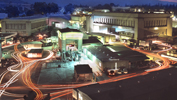

A picture of how the Lab has been doing with regards to safety is vividly painted with a series of slides featuring statistics on a variety of categories. These include recordable cases for the entire Lab, by division, and job classification, injury rates and categories, and how the Lab's performace compares to DOE contract goals. Go here to view the slides, and here to visit the Our Safety site.
 Research: Secret Lives of Nanoscale Catalysts Revealed
Research: Secret Lives of Nanoscale Catalysts Revealed The first-ever glimpse of nanoscale catalysts in action could lead to improved pollution control and fuel cell technologies. Scientists from Berkeley Lab — including Miquel Salmeron and Gabor Somorjai — observed catalysts restructuring themselves in response to various gases swirling around them, like a chameleon changing its color to match its surroundings. More> ![]()
 Benefits: Open Enrollment Fair in Perseverance Hall on Tuesday, Oct. 28
Benefits: Open Enrollment Fair in Perseverance Hall on Tuesday, Oct. 28 Employees are invited to attend the Lab’s Open Enrollment Fair this coming Tuesday (Oct. 28) from 11 a.m. to 2:30 p.m. in Perseverance Hall. Attendees can meet with UC-sponsored health and welfare vendors to learn more about their services, as well as pick up a gift and a free chair massage. Open Enrollment runs from Oct. 30 to Nov. 25. More>
 People: Lab Veteran Tapped as Education Head for Underground Science Lab
People: Lab Veteran Tapped as Education Head for Underground Science LabPeggy Norris, with Berkeley Lab’s Nuclear Sciences Division, has been hired to serve as the deputy director for education and outreach for the Deep Underground Science and Engineering Laboratory (DUSEL) in South Dakota. She will act as a liaison between Black Hills State University and DUSEL on activities relating to education. Norris begins on Jan. 5. More>
 World of Science: The Once and Future SLAC
World of Science: The Once and Future SLACIt used to be the Stanford Linear Accelerator Center, but everybody called it SLAC. To make it perfectly clear that SLAC is a U.S. Department of Energy lab, managed by but distinct from Stanford University, last week DOE renamed it the SLAC National Accelerator Laboratory. What will people call it in future? SLACNAL? Or perhaps, by analogy to the Fermi National Accelerator Laboratory, SLAClab? An unscientific poll of undecided voters suggests that the new name, just like the old one, will be SLAC. More>
Berkeley Lab is experiencing a small increase in inappropriate, copyright-infringing use of peer-to-peer (P2P) tools, especially Bittorrent. While the Lab does not block legitimate uses of P2P, the use of any Lab system in copyright-infringing behavior is strictly prohibited. Sharing or downloading copyrighted music and movies is the most common problem. Violation may lead to loss of network use and/or disciplinary action. More>
The Lab’s Creative Services Office can provide translation in more than 40 languages, including Arabic, Chinese, French, Hindi, Japanese, Russian, and Spanish, for documents and other materials. If required, localization (adaptation to local preferences of different cultures) can also be provided. The translation service is available only for unclassified documents. Contact [email protected] for more information.
October is National Dental Hygiene Month, which is a good time to remind people how important oral health is to overall health. In fact, many conditions, such as diabetes and heart disease, can be detected early by an oral examination. Pain and suffering due to untreated dental disease can cause problems with eating, speaking, and concentration. The Lab’s Delta Dental insurance covers prophylaxis cleaning twice per calendar year.
The Laboratory is proposing to change the RPM section describing its compensation policy. Section 2.06 has been revised to consolidate compensation policies into one location, and to update or remove obsolete language, procedures, and non-policy verbiage. This policy applies to non-represented employees only. Represented employees should contact their union representative or consult their collective bargaining agreement. To comment on this proposed change, contact [email protected] by Oct. 29. Go here to review the proposed revision.